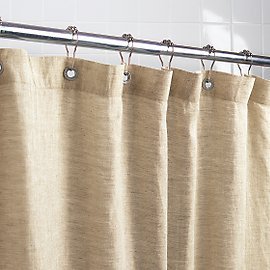Thinking about renovating your bathroom? Want to do it in an environmentally sound way?
Here are some tips for creating your dream bathroom while improving your health and saving the environment at the same time.
Thinking about renovating your bathroom? Want to do it in an environmentally sound way?
Here are some tips for creating your dream bathroom while improving your health and saving the environment at the same time.
Countertops

Most common countertops are built using solid surface materials like plastic laminate, tile, and granite. Because they often use a petroleum base, solid machine-able counter materials are not ecologically friendly. Granite countertops, despite their great looks, are not sustainable due to the quarrying process and the high energy consumption used when shipping this heavy item.
The ideal countertop material would have a solid, nonporous surface that is stain and scratch proof. Of course, it would also be beautiful, inexpensive and available in a wide variety of colors. Recycled glass / lightweight cast concrete, recycled glass ceramic tiles and recycled plastic are excellent environmental choices for durable, nontoxic, resource efficient countertops.
Flooring
Finding the right eco-friendly product for flooring can be a daunting task, but luckily there are several good options available.

Reclaimed hardwood floors are a great option since they can be periodically refinished and resealed, increasing their practicality. Since demand for reclaimed hardwood has increased, most flooring stores carry the product without having to put down a special order.

Bamboo flooring is a great eco-friendly option since the plant is a highly renewable resource that is able to mature within three to five years. It is also relatively easy to maintain by sweeping, vacuuming, and occasionally mopping. There are certain types of bamboo that can be extremely strong, hard, and durable. Natural, un-carbonized bamboo can be as durable as red oak. Strand woven bamboo can be manufactured even harder than that.

Linoleum flooring is tough and can last for decades if taken care of properly. It is made of non-toxic materials that do not persist in the environment and are biodegradable. Among the “greenest” of floors, linoleum is made from natural materials: linseed oil, resins, recycled wood flour, cork dust, limestone and mineral pigments, mounted on jute backing. Linoleum flooring offers easy maintenance because it does not require regular polishing or refinishing like hardwood flooring. It is water resistance and can be used on bathroom floors in place of ceramic tiles.

Recycled glass flooring can add a unique design to any bathroom with its many colors and can be arranged in simple or intricate patterns. Glass tiles are resistant to stains, mold, mildew, chemical damage, and aren’t porous. They can easily be cleaned with warm water and a mild vinegar solution to remove soap scum buildup. Glass tiles use roughly half the amount of energy to produce than it does to make ceramic tiles in the same size.

Rubber floors are highly resilient and can handle heavy wear. For households with lots of traffic from children and pets, rubber flooring is a practical option. In addition, studded rubber provides more grip than smooth rubber, making it safer for people with disabilities to move around and reduce slippage. Natural rubber floors are a renewable resource. Recycled rubber floors remanufactured from post-consumer products like old car tires are even more ecological.
Paint
When painting the walls choose products with low volatile organic compounds (VOC).
A paint consists of a resin (or binder), a carrier, and pigments that gives the paint its color. Once the paint is applied to a surface, the carrier evaporates, leaving behind the solid coating. The carrier is usually a VOC. VOCs are linked to a range of health problems, including some serious diseases. Benzene, for example, is one of several VOCs that are known to cause cancer. Other health effects besides cancer include kidney damage, liver damage, damage to the central nervous system (including the brain, as well as more minor complaints like headaches and eye, throat and nose irritation.
Today, many American companies shower us with “green” messages which can be confusing or misleading. When purchasing the most ecological paint, do your research. For a paint to actually call itself "low-VOC," the EPA requires that it have no more than 250 grams per liter of VOCs for flat and latex paint (oil-based paints) can have up to 380 g/l. (some places, like California, have even stricter standards). To call itself VOC-free, paint can have no more than 5 g/l of VOCs. Many ecological paint products now use water-based formulas, significantly reducing the solvents to low and zero VOC. The colors are derived from natural pigments, as well as other natural ingredients such as china clay, lime putty, and linseed oil.
Fixtures
With so many fixtures in the bathroom, green products can get pretty expensive. Spending more on a few highly efficient fixtures initially can save you money in the long run.
For sinks and bath tubs, use natural ceramic & non-toxic cement products like Lithistone.
When deciding on faucets and shower heads look for eco-friendly, low-flow products that have little to no lead. Products labeled “Watersense” are EPA-approved to use less water than those that are not. Most manufacturers are phasing out their older high-lead products and replacing them with new low-lead versions.

For toilet seats, look for toilets with the dual-flush system – one which uses less water for urinating and a second for bowel movements.
Our next blog post will have more information on eco-friendly toilets and water saving techniques.
Accessories
Avoid using vinyl shower curtains since they contain harmful chemicals like phthalates, oranotins, toluene, xylene, ethylbenzene, and methyl isobutyl ketone. These chemicals can cause headaches, nausea, and damage the liver, central nervous system, respiratory and reproductive system. Instead, use PVC (polyvinyl chloride)-free plastic or hemp.

Use recycled glass as wall decorations for mirrors and backsplashes.








